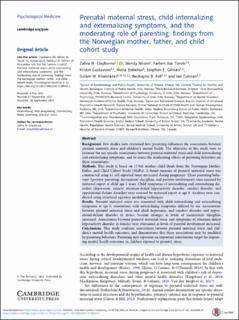| dc.description.abstract | Background Few studies have examined how parenting influences the associations between prenatal maternal stress and children's mental health. The objectives of this study were to examine the sex-specific associations between prenatal maternal stress and child internalizing and externalizing symptoms, and to assess the moderating effects of parenting behaviors on these associations. Methods This study is based on 15 963 mother–child dyads from the Norwegian Mother, Father, and Child Cohort Study (MoBa). A broad measure of prenatal maternal stress was constructed using 41 self-reported items measured during pregnancy. Three parenting behaviors (positive parenting, inconsistent discipline, and positive involvement) were assessed by maternal report at child age 5 years. Child symptoms of internalizing and externalizing disorders (depression, anxiety, attention-deficit hyperactivity disorder, conduct disorder, and oppositional-defiant disorder) were assessed by maternal report at age 8. Analyses were conducted using structural equation modeling techniques. Results Prenatal maternal stress was associated with child internalizing and externalizing symptoms at age 8; associations with externalizing symptoms differed by sex. Associations between prenatal maternal stress and child depression, and conduct disorder and oppositional-defiant disorder in males, became stronger as levels of inconsistent discipline increased. Associations between prenatal maternal stress and symptoms of attention-deficit hyperactivity disorder in females were attenuated as levels of parental involvement increased. Conclusions This study confirms associations between prenatal maternal stress and children's mental health outcomes, and demonstrates that these associations may be modified by parenting behaviors. Parenting may represent an important intervention target for improving mental health outcomes in children exposed to prenatal stress. | |
